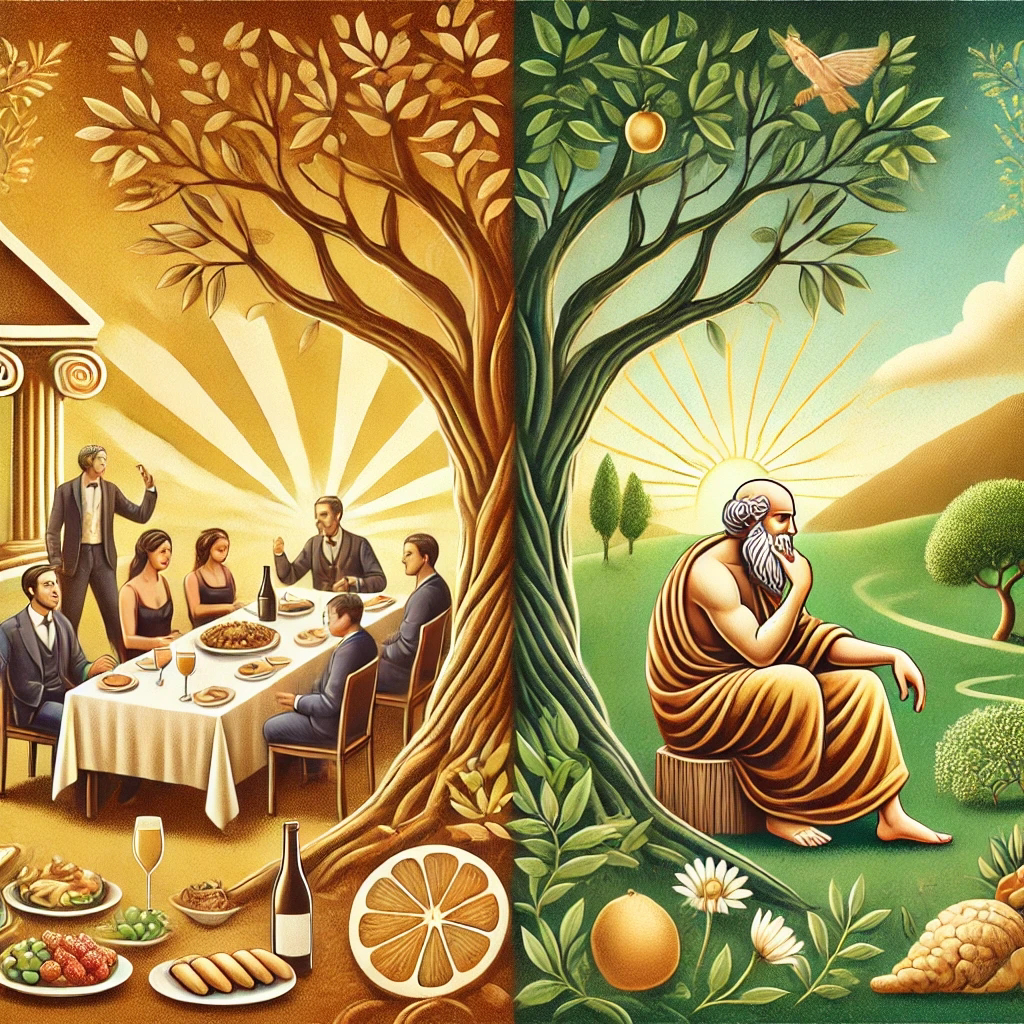Hedonism is often misunderstood. Many associate it with reckless indulgence—endless parties, luxury, and excess. But at its core, hedonism is a philosophy about pleasure as the highest good. The real question is: what kind of pleasure, and to what end?
Defining Hedonism
Hedonism, in its simplest form, is the belief that pleasure and happiness are the most important aspects of life. This idea has been explored in philosophy, psychology, and even neuroscience. The debate isn’t about whether pleasure is valuable—it’s about how to define it and whether it’s the sole criterion for a good life. Throughout history, thinkers have split hedonism into different camps, each with its own take on what pleasure truly means.
Cyrenaic Hedonism: Instant Gratification
One of the earliest forms of hedonism comes from the Cyrenaics, followers of Aristippus of Cyrene. They believed in immediate pleasure—eat, drink, and be merry, for tomorrow we may die. To them, bodily pleasures were the most important, and long-term consequences were secondary. This version of hedonism is what most people think of when they hear the term, but it’s only one side of the coin.
Epicurean Hedonism: Strategic Enjoyment
Epicurus took a different approach. He argued that true pleasure comes from moderation and the absence of pain. Overindulgence, he warned, often leads to suffering, so the wise hedonist should seek simple joys. A good meal, deep conversation, and inner tranquility were more valuable than an extravagant feast followed by a hangover.
Psychological Hedonism: Hardwired for Pleasure
Psychologists have examined hedonism through the lens of human behavior. Psychological hedonism suggests that all human actions are motivated by the pursuit of pleasure and the avoidance of pain. Neuroscience supports this to some extent—dopamine, the brain’s reward chemical, reinforces behaviors that bring pleasure. But if pleasure is our primary driver, why do people often make choices that lead to suffering?
Ethical Hedonism: Should Pleasure Be the Goal?
Ethical hedonism argues that individuals should pursue pleasure as the highest good. Thinkers like Jeremy Bentham and John Stuart Mill expanded this idea into utilitarianism. They proposed that moral actions are those that maximize pleasure and minimize pain for the greatest number. But does that mean sacrificing individual happiness for the collective good?
The Problem of Excess
One of the biggest criticisms of hedonism is its potential for excess. Too much pleasure-seeking can lead to addiction, dissatisfaction, and emptiness. The paradox of hedonism states that directly pursuing pleasure often leads to its opposite—unhappiness. This is why many hedonists, including Epicurus, advocated for balance and restraint.
The Modern Hedonist: Pleasure with Purpose
Today, hedonism takes on new forms. Some argue for eudaimonic pleasure—finding joy through meaning, growth, and self-actualization. Others embrace digital hedonism, using technology to optimize happiness. The key difference between reckless indulgence and sustainable pleasure lies in intention—are we seeking momentary highs or lasting fulfillment?
The Science of Pleasure
Modern research supports the idea that pleasure is complex. Short-term pleasures, like eating sweets, activate the brain’s reward system but can lead to diminishing returns. Long-term pleasures, such as achieving a goal, create deeper satisfaction. The best approach may be a blend of both—enjoying life’s pleasures while striving for meaningful experiences.
Hedonism and Society
Societal norms shape how hedonism is viewed. Some cultures encourage pleasure-seeking, while others promote discipline and restraint. Economic factors also play a role—capitalism thrives on consumerist hedonism, pushing people to buy happiness. The question remains: does our pursuit of pleasure make us freer or more enslaved?
Can Hedonism Lead to a Good Life?
The answer depends on how we define pleasure. If it’s pure indulgence, the risks are high—burnout, addiction, and disillusionment. But if it’s a balanced pursuit of joy, growth, and connection, hedonism can be a powerful philosophy for living well. The challenge is knowing when to indulge and when to step back.
Final Thoughts
Hedonism isn’t just about pleasure—it’s about what makes life worth living. Whether through momentary joys or long-term fulfillment, the pursuit of happiness is at the heart of the human experience. But pleasure alone isn’t enough. The best life is one that balances enjoyment with purpose, indulgence with wisdom, and satisfaction with meaning.




